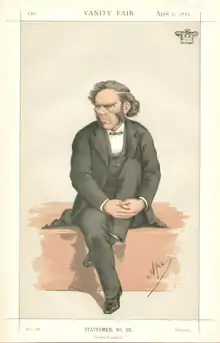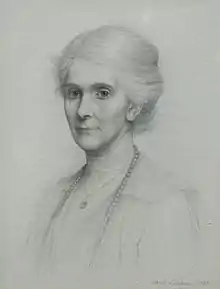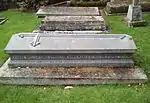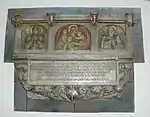George Lyttelton, 4th Baron Lyttelton
George William Lyttelton, 4th Baron Lyttelton, 4th Baron Westcote, KCMG, PC, DL, FRS (31 March 1817 – 19 April 1876) was an English aristocrat and Conservative politician from the Lyttelton family. He was chairman of the Canterbury Association, which encouraged British settlers to move to New Zealand.
The Lord Lyttelton | |
|---|---|
 Lord Lyttelton by Carlo Pellegrini, 1871 | |
| Personal details | |
| Born | 31 March 1817 |
| Died | 19 April 1876 |
| Nationality | British |
| Spouse(s) | Mary Glynne, Sybella Harriet Clive |
| Children | 15, including Charles Lyttelton, 8th Viscount Cobham |
| Parents | William Lyttelton, 3rd Baron Lyttelton Lady Sarah Spencer |
Early life
Lyttelton was the eldest son of William Henry Lyttelton, 3rd Baron Lyttelton, and Lady Sarah Spencer, daughter of George John Spencer, 2nd Earl Spencer. He was educated at Eton and Trinity College, Cambridge.[1] He succeeded his father as fourth Baron Lyttelton in 1837 and took his seat in the House of Lords on his 21st birthday a year later. The Lyttelton seat is Hagley Hall in Worcestershire.
Political career
In January 1846 Lyttelton became Under-Secretary of State for War and the Colonies in the Conservative government of Sir Robert Peel, a post he held until the government fell in June of the same year. Lyttelton was also Lord Lieutenant of Worcestershire from 1839 to 1876 and the first President of the Birmingham and Midland Institute in 1854. Moreover, he promoted the settlement (1850 onwards) of Canterbury, New Zealand with Anglican colonists. The port town Lyttelton, New Zealand bears his name. He served as president of the British Chess Association at the time of the Staunton–Morphy controversy in 1858.[2] He was appointed a Knight Commander of the Order of St Michael and St George (KCMG) in the 1869 Birthday Honours.[3]
Family

by Frank Bernard Dicksee
Lord Lyttelton married, firstly in 1839, Mary Glynne, daughter of Sir Stephen Glynne, 8th Baronet, and sister-in-law of William Ewart Gladstone. They had eight sons and four daughters:
- The Honorable Meriel Sarah Lyttelton (1840–1925) married John Gilbert Talbot and was the mother of Meriel Talbot.
- The Honorable Lucy Caroline Lyttelton (1841–1925), married Lord Frederick Cavendish and the Lucy Cavendish College at Cambridge is named after her.
- Charles Lyttelton, 8th Viscount Cobham (1842–1922) succeeded his father.
- The Honorable Rev Albert Victor Lyttelton (1844–1928), Headmaster of St Andrew's School, Bloemfontein (1884–1885).
- The Honorable Neville Gerald Lyttelton (1845–1931), became a General in the British Army.
- The Honorable George William Spencer Lyttelton (1847–1913), was a British civil servant and private secretary to Gladstone.
- The Honorable Lavinia Lyttelton (1849–1939), married Right Rev Edward Stuart Talbot and is the great-great-grandmother of adventurer Bear Grylls.
- The Honorable May Lyttelton (1850–1875), whom Arthur Balfour had hoped to marry. Balfour remained a bachelor thereafter.
- The Honorable Arthur Temple Lyttelton (1852–1903), became an Anglican Bishop
- The Honorable Robert Henry Lyttelton (1854–1939), cricketer.
- The Honorable Edward Lyttelton (1855–1942), became headmaster of Eton College
- The Honorable Alfred Lyttelton (1857–1913), sportsman and politician.
After Mary's death in 1857 Lyttelton married, secondly, Sybella Harriet Clive, daughter of George Clive MP, in 1869. They had three daughters:
- The Honorable Sarah Kathleen Lyttelton (12 May 1870 – 1 October 1942); she married John Bailey on 26 April 1900. They had children.
- The Honorable Sybil Lyttelton (17 February 1873 – 2 October 1934); she married Sir Lionel Cust on 16 July 1895. They had one son:
- Sir Lionel George Arthur Cust (6 June 1896 – 22 May 1962)[4]
- The Honorable Hester Margaret Lyttelton (26 December 1874 – 26 March 1958); she married Very Reverend Cyril Argentine Alington on 5 April 1904. They had six children:
- Patrick Alington ( -1943)
- Giles Alington (1914–1956)
- Kathleen Alington
- Elizabeth Hester Alington (6 November 1909 – 3 September 1990)
- Joan Argentine Alington (5 November 1916 – 1999)
- Lavinia Alington
Death



In 1876 Lyttelton took his own life at the age of 59 by throwing himself down the stairs in a London house.[5] He was succeeded by his eldest son Charles, who later also inherited the viscounty of Cobham. Lady Lyttelton died in 1900.
Notes
- "Lyttelton, George William (LTLN833GW)". A Cambridge Alumni Database. University of Cambridge.
- "The life and chess of Paul Morphy: extra information". Archived from the original on 2 July 2007. Retrieved 16 August 2008.
- "No. 23512". The London Gazette. 1 July 1869. p. 3750.
- Sir Lionel George Arthur Cust. A genealogical survey of the peerage of Britain as well as the royal families of Europe.
- Sheila Fletcher, Victorian Girls: Lord Lyttelton's Daughters
References
- Kidd, Charles, Williamson, David (editors). Debrett's Peerage and Baronetage (1990 edition). New York: St Martin's Press, 1990,
- Leigh Rayment's Peerage Pages
- George Lyttelton profile, CricketArchive.com; accessed 2 April 2016.
External links
 Media related to George Lyttelton, 4th Baron Lyttelton at Wikimedia Commons
Media related to George Lyttelton, 4th Baron Lyttelton at Wikimedia Commons- Hansard 1803–2005: contributions in Parliament by Lord Lyttelton
| Political offices | ||
|---|---|---|
| Preceded by George William Hope |
Under-Secretary of State for War and the Colonies 1846 |
Succeeded by Benjamin Hawes |
| Honorary titles | ||
| Preceded by The Lord Foley |
Lord Lieutenant of Worcestershire 1839–1876 |
Succeeded by The Earl Beauchamp |
| Peerage of Great Britain | ||
| Preceded by William Lyttelton |
Baron Lyttelton 1837–1876 |
Succeeded by Charles Lyttelton |